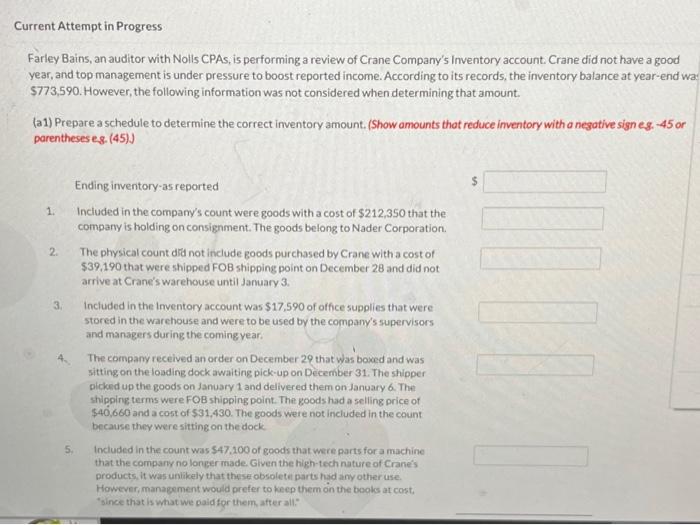Farley Bains, an auditor with Nolls CPAs, is performing a review of Crane Company's Inventory account. Crane did not have a good year, and top management is under pressure to boost reported income. According to its records, the inventory balance at year-end was $773,590. However, the following information was not considered when determining that amount. (a1) Prepare a schedule to determine the correct inventory amount. (Show amounts that reduce inventory with a negative sign eg. -45 or parentheses e.g. (45).) Current Attempt in Progress Farley Bains, an auditor with Nolls CPAs, is performing a review of Crane Company's Inventory account. Crane did not have a good year, and top management is under pressure to boost reported income. According to its records, the inventory balance at year-end wa $773,590. However, the following information was not considered when determining that amount. (a1) Prepare a schedule to determine the correct inventory amount. (Show amounts that reduce imventory with a negative sign eg. -45 or parentheseseg. (45)) Ending inventory-as reported 1. Included in the company's count were goods with a cost of $212,350 that the company is holding on consignment. The goods belong to Nader Corporation. 2. The physical count did not include goods purchased by Crane with a cost of $39,190 that were shipped FOB shipping point on December 28 and did not arrive at Crane's warehouse until January 3. 3. Included in the Inventory account was $17,590 of office supplies that were stored in the warehouse and were to be used by the company's supervisors and managers during the coming vear. 4. The company received an order on December 29 that was boved and was sitting on the loading dock awaiting pick-up on December 31 . The shipper picked up the goods on January 1 and delivered them on January 6 . The shipping terms were FOB shipping point. The goods had a selling price of $40,660 and a cost of $31,430. The goods were not included in the count because they were sitting on the dock 5. Included in the count was $47.100 of goods that were parts for a machine that the company no longer made. Given the high-tech nature of Crane's products, it was unlikely that these obsolete parts had any other use. However, management would prefer to keep them on the books at cost. "since that is what we paid for them, after all:" $








